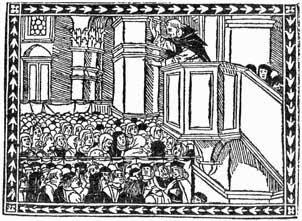 I was on a panel on digital humanities at the Shakespeare Association of America (SAA) in St. Louis recently when the question of access, public input, and crowdsourcing arose. Academics, particularly at a Shakespeare association, can be a funny bunch, and deeply suspicious of the public. That's even true among the relatively small crowd doing work on digital humanities. One member of my panel argued, for example, that projects that encourage public crowdsourcing, for example to transcribe Civil War Diaries or to write biographies of early publishers, threaten to "reproduce the
I was on a panel on digital humanities at the Shakespeare Association of America (SAA) in St. Louis recently when the question of access, public input, and crowdsourcing arose. Academics, particularly at a Shakespeare association, can be a funny bunch, and deeply suspicious of the public. That's even true among the relatively small crowd doing work on digital humanities. One member of my panel argued, for example, that projects that encourage public crowdsourcing, for example to transcribe Civil War Diaries or to write biographies of early publishers, threaten to "reproduce the dominant discourse." I'm summarizing, but the argument was basically this: public contributors skew toward interest in white, male figures, obscuring minorities and women, and this is the fatal flaw in crowdsourcing. The final statement, I think verbatim was, "that may not be a problem for you, but it is for me."
Actually though, I don't see why the "public" discourse is any more a dominating one than the controlled scholarly discourse that flourishes within places like the SAA. Personally, I always get nervous when I hear someone saying that the masses are not really fit to write their own history and that the task is better left in the hands of a scholarly elite.
While we were at SAA in St. Louis, the Shakespeareans shared the hotel with a cosmetics association, and in the same month, the Pile Drivers of South Carolina also held their annual meeting in the same space. Frankly, I bet neither of those gatherings policed hierarchies as rigidly as the SAA. From tuition fees to registration, organizations like this are not necessarily on the side of the angels. More power to DH projects that change that dynamic.
No comments:
Post a Comment